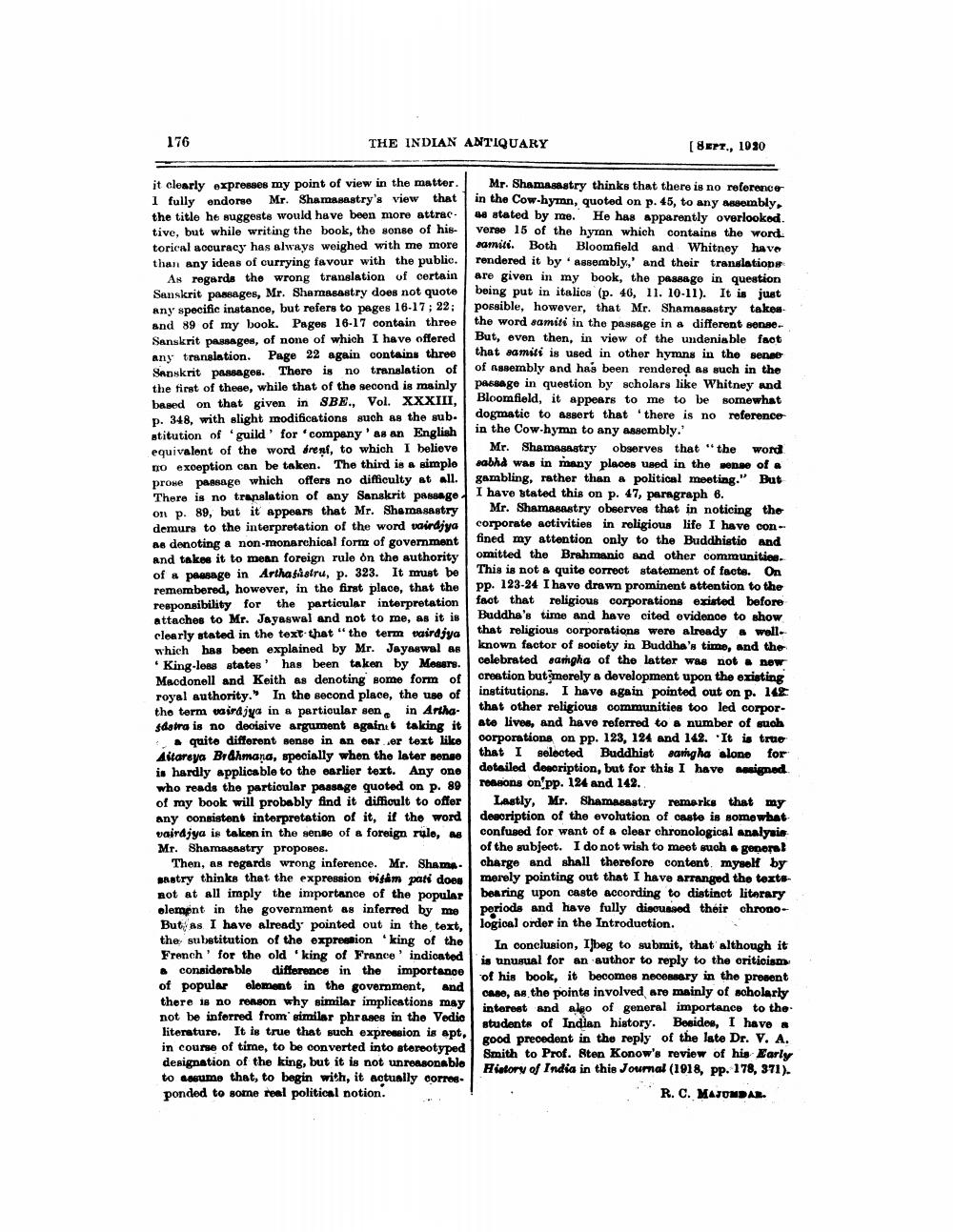________________
176
THE INDIAN ANTIQUARY
[ SEPT., 1030
it clearly express my point of view in the matter. Mr. Shamasastry thinks that there is no reference I fully endorse Mr. Shamasastry's view that in the Cow-hymn, quoted on p. 45, to any moombly, the title he suggests would have been more attrac- 48 stated by me. He has apparently overlooked tive, but while writing the book, the sonse of his- verse 15 of the hyron which contains the word torical accuracy has always weighed with me more samiti. Both Bloomfield and Whitney have than any ideas of ourrying favour with the public. rendered it by assembly,' and their translations
As regards the wrong translation of certain are given in my book, the passage in question Sanskrit passages, Mr. Shamasastry does not quote being put in italics (p. 46, 11. 10-11). It is just any specific instance, but refers to pages 16-17; 22; possible, however, that Mr. Shamasastry takes and 89 of my book. Pages 16-17 contain three the word samiti in the passage in a different sonne Sanskrit passages, of none of which I have offered But, even then, in view of the undeniable fact any translation. Page 22 again contains three that samiti is used in other hymns in the sense Sanskrit passages. There is no translation of of Rssembly and has been rendered as such in the the first of these, while that of the second is mainly passage in question by scholars like Whitney and based on that given in SBE., Vol. XXXIII, Bloomfield, it appears to me to be somewhat P. 348, with slight modifications such as the sub. dogmatic to assert that there is no reference stitution of guild for company as an English in the Cow-hymn to any assembly.' equivalent of the word dren, to which I believe Mr. Shamasastry observes that "the word
O exception can be taken. The third is a simplo sabha was in many places used in the wense of prone passage which offers no difficulty at all. gambling, rather than a political meeting." But There is no translation of any Sanskrit passage
I have stated this on p. 47, paragraph 6. on p. 89, but it appears that Mr. Shamasastry
Mr. Shamasastry observes that in noticing the demurs to the interpretation of the word vairdjya corporate activities in religious life I have conas denoting a non-monarchical form of government
fined my attention only to the Buddhistio And and takes it to mean foreign rule on the authority omitted the Brahmanic and other communities of a passage in Arthasistru, p. 323. It must be This is not a quito correct statement of facte. On remembered, however, in the first place, that the
pp. 123-24 I have drawn prominent attention to the responsibility for the particular interpretation
fact that religious corporations existed before attaches to Mr. Jayaswal and not to me, as it is Buddha's time and have cited ovidence to show clearly stated in the text that "the term vairdjya
that religious corporations were already well. which has been explained by Mr. Jayaswal as
known factor of society in Buddha's time, and the . King-less states' has been taken by Messrs.
celebrated sangha of the latter was not now Macdonell and Keith as denoting some form of
creation but merely a development upon the existing royal authority. In the second place, the use of
institutions. I have again pointed out on p. 112 the term windjya in a particular sen in Artha
that other religious communities too led corporsdatra is no decisive argument again taking it
ato lives, and have referred to a number of such quito different sense in an ear..er text lilce
corporations on pp. 123, 124 and 142. It is true Aitareya Brahmana, specially when the later sengo
that I selected Buddhist sangha slone for in hardly applicable to the earlier text. Any ono
detailed description, but for this I have nesigned who reads the particular passage quoted on p. 89
reasons on pp. 124 and 142. of my book will probably find it difficult to offer 1 Lastly, Mr. Shamasastry remarks that my any consistent interpretation of it, if the word description of the evolution of custo is somewhat vairdjya is taken in the sense of a foreign rulo, as confused for want of a clear chronological analysis Mr. Shamasastry proposes.
of the subject. I do not wish to meet wuch general Then, as regards wrong inference. Mr. Shame.
charge and shall therefore content myself by Bastry thinks that the expression witam pati does merely pointing out that I have arranged the texte not at all imply the importance of the popular bearing upon caste according to distinct literary olempnt in the government as inferred by me periods and have fully discussed their chronoBut as I have already pointed out in the text, logical order in the Introduction. the substitution of the expression 'king of the
In conclusion, I beg to submit, that although it French' for the old 'king of France' indicated
is unusual for an author to reply to the oriticism & considerable difference in the importance
of his book, it becomes necessary in the present of popular element in the government, and
CABO, as the points involved are mainly of scholarly there is no reason why similar implications may
interest and algo of general importance to the not be inferred from similar phrases in the Vedic
students of Indian history. Besides, I have a literature. It is true that such expression is apt,
good precedent in the reply of the late Dr. V. A. in course of time, to be converted into stereotyped
Smith to Prof. Sten Konow's review of his Early designation of the king, but it is not unreasonable
History of India in this Journal (1918, pp. 178, 371). to assume that, to begin with, it actually corregponded to some real political notion.
R. C. MAJUMDAR




